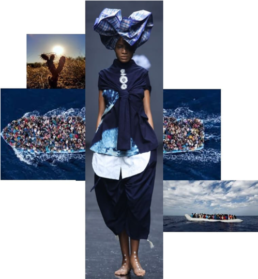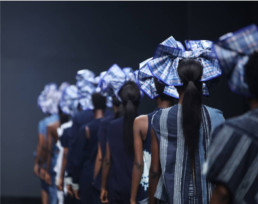NKWO brings a refreshing blue hue to fashion, they are a Nigerian fashion label that aims to stray away from modern methods of fabric production.
A story of sustainability, NKWO is bringing the best of both tradition and also a view into what our future production should look like. With the innovative Dakala cloth NKWO brings a refreshing blue hue to the fashion world.
Founder
Not your typical designer, Nkwo Onwuka’s story to the success for her label is truly beautiful and inspiring. Onwuka’s interests in fashion first arose with her childhood dolls and learning to sew. Most importantly, what began as a childhood hobby, transformed into a successful ethical label. Nkwo Onwuka has been experimenting with means of making cloth for years, and with success both in the United Kingdom and in Nigeria. A dreamlike story has also been carried over to her often free-spirited designs in her collections.
Production
Currently, Nkwo is exploring the Nkwo original: Dakala Cloth. Drawing inspirations from artisanal African weaving techniques, as well as a distaste for the larger fashion industry’s means of production – the Dakala cloth, was born after lots of research. Dakala is a ‘strip weaving technique born from left-over pieces of denim and the sound of traditional weaving techniques. Nkwo is environmentally sustainable, but it also works hard to be economically sustainable by supporting small and local businesses across Africa.
Latest
Nkwo was presented at the Lagos Fashion Week Exhibition: Woven Threads, as part of the sustainable brands.



Interview with Nkwo Onwuka
1. How has the fashion Africa industry changed in the last ten years?
10 years ago, the African fashion industry was still quite new and was trying to find a voice in a space that was dominated, and where the rules were set by the West. As such, there was only room for a very Western aesthetic or for African fashion that looked the way the West expected to see it. African designers that told the story from a unique point of view were not celebrated enough. It is great to see that now our industry has started to look inwards and embrace all of our stories and most of all, we have learned to value and celebrate our traditional craft skills.
2. Can you tell us more about the Dakala Cloth?
Dakala Cloth was invented as a means of reducing textile waste. Being a research-focused label we are constantly experimenting and looking at ways of solving the very modern problem of excess textile waste, but also looking at ways of bringing our traditional craft skills into the 21st century. We first worked with denim off-cuts and the result was a piece of cloth that had the look and feel of a handwoven textile but with a technique that was less time consuming and also a sustainable way of preserving our handicrafts, ensuring that they can continue into the future. We named it Dakala Cloth as an ode to the sound of a working loom – Sakala-si, Sakala-sa – and to denim, which is one of the fabrics we work with the most.
3. How is it possible to stay sustainable and have production spread across Africa?
There are so many definitions in the word ‘sustainable’. Responsible production and consumption, sustainable communities, no poverty, decent work and economic growth – by working closely with artisans and local makers we can create meaningful change on the continent by involving the many parts of the expanding fashion eco-system in a new way of working that is more mindful as it celebrates and preserves the art of creation.
4. What needs to improve for sustainable fashion to become more accessible?
By default, most of the independent brands in Africa are ‘sustainable’ in one way or another and are accessible to consumers in quite small circles. Going digital
is the best way to open up and be more accessible to a wider audience.
5. What advice would you have for someone who wants to start their own label?
Ask yourself 3 very important questions:
- WHY do you want to start your own label?
- WHAT do you want to achieve?
- HOW do you intend to achieve it?

[…] look of ONU is the transformation of the DAKALA Cloth developed by NKWO into a print design and so bears the unmistakable signature of designer Nkwo Onwuka. The fringes of […]
[…] an interview with the online magazine Fashion Africa Now, Nkwo Onwuka explained her label’s sustainable realities, saying, “being a research-focused […]